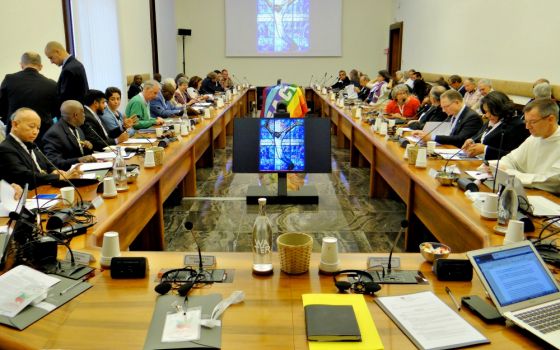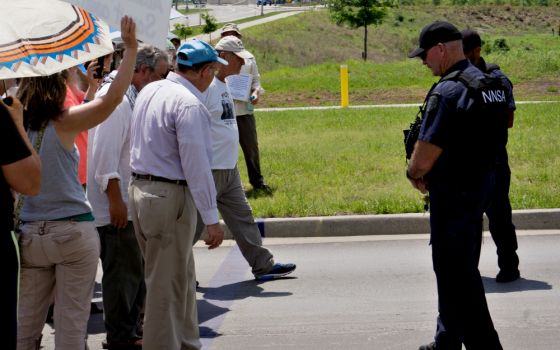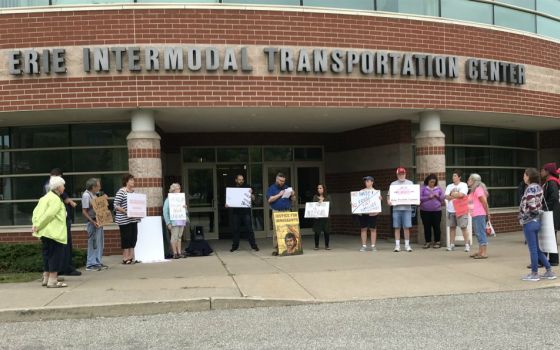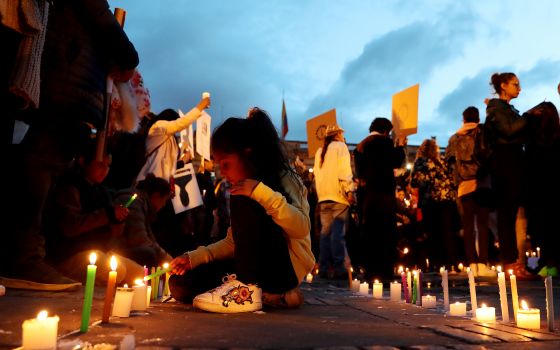In the third week of August, Milwaukee was set ablaze and night curfews imposed. Video images that show Aleppo, Syria, disintegrating are so intense, viewers avert their eyes. There were no mass shootings in the U.S. that week, but in Kansas City, Mo., two preteen boys were shot and killed, their sister wounded; police are looking for a reason. Boko Haram released video of some of the 200 girls they kidnapped and have held hostage for two years, but the release causes more anguish than relief. Some of the girls hold babies, hinting at what they have endured.
The world seems engulfed in violence and spiraling into a deep, unlit pit of chaos. In the face of such unmitigated brutality, it seems no solution can be reached. It is enough to cause despair.
But don't lose hope. And don't succumb to the temptation to meet violence with violence. In our Catholic Christian tradition, we can find paths and guidance to secure peace in our neighborhoods and across the world. More than just teaching, Catholics are active in making peace at all levels of society. Stories of peacemakers and peacemaking have appeared in NCR as long as we have been publishing. A few examples follow.
On our website, under the series tag "Reconciliation in Chicago" is a collection of reflections from the staff and volunteers of the Precious Blood Ministry of Reconciliation. Hosted by the Missionaries of the Precious Blood and based in Chicago's Back of the Yards neighborhood since the early 2000s, it is a ministry of presence and accompaniment, building community in neighborhoods beset by violence and high rates of incarceration.
Jesuit Fr. Greg Boyle lives among ex-cons, gang members and former gang members in Los Angeles. For 30 years, Boyle's Homeboy Industries has provided job training, and other opportunities to pull young men and women off the streets and into new lives. Besides baking and catering, Homeboys are installing solar panels.
Eleven years ago, Sr. Dorothy Stang was murdered on the side of an unpaved road on the edge of the Brazilian rainforest because of her advocacy work among the small farmers and indigenous people of Para state. Stang's order, the Sisters of Notre Dame de Namur, carry on her work in the small city of Anapu in the simple wooden house where the nun lived until her death.
The Pastoral Land Commission, an organization that Stang worked with closely, was founded by the National Conference of Brazilian Bishops in 1975 to advocate for landless peasants against corporate and wealthy land barons. It has long focused on combating violence against largely invisible rural people and has become the major institutional defender of human rights in Brazil.
Solidarity With South Sudan is an experiment in religious mission amid one of the most intractable conflicts in the world.
Around the world, bishops and bishops' conferences broker cease-fires and quell civil unrest. Cardinal Jaime Sin famously kept the coup against Philippines dictator Ferdinando Marcos peaceful by calling for mass street demonstrations led by Catholic religious. The church's efforts at individual, communal and institutional reconciliation in Mindanao have made the southern Philippines region a model of Christian-Muslim cooperation.
An Italian Catholic lay association, the Community of Sant'Egidio, joined international negotiations that ended the Mozambique civil war in 1992. Sant'Egidio, which is also active in ending capital punishment, has used its "faith-based mediation" in conflict zones in Guatemala and the Balkans.
From jungle footpaths to urban asphalt streets to marbled corridors of power, Catholics have found practical, workable solutions to the violence that plagues our world. Now is the time to make peacemaking a primary ministry of the Catholic church.
In April, Pax Christi International and the Pontifical Council for Justice and Peace convened a group of peace experts and practitioners for the conference "Nonviolence and Just Peace: Contributing to the Catholic Understanding of and Commitment to Nonviolence."
Conference organizers said they sought a "new articulation of Catholic teaching on war and peace… an alternative ethical framework for engaging acute conflict and atrocities by developing the themes and practices of nonviolent conflict transformation and just peace."
NCR is committed to helping find this alternative ethical framework, and to that end over the next few weeks, NCR will be exploring themes and issues raised by the conference. The first is in our latest print issue (dated Aug 26-Sept 8, 2016), by Eli S. McCarthy (which will be posted online Aug. 24).
The peacemakers who met in April provide a list of actions for Catholics to take, including:
- Promoting nonviolent practices and strategies in all aspects of our lives;
- Incorporating these themes in our intellectual and sacramental lives;
- Replacing the use and teaching of "just war theory" with a "just peace theory";
- Continuing to advocate for the abolition of war and nuclear weapons.
They also asked Pope Francis to write and "share with the world an encyclical on nonviolence and Just Peace." NCR seconds that suggestion, but adds one more dimension: a Synod of Bishops dedicated to just peace.
Francis engaged the world's Catholic community around the two synods on family life. Imagine what a synod on just peace would mean, especially if invited to testify were people like Boyle, the Missionaries of the Precious Blood, Stang's sisters, and officials from Brazil's Pastoral Land Commission. If Christians and Muslims from Mindanao addressed this synod on peace, imagine the lessons they would teach and the examples they could show.
Francis should write an encyclical on just peace, but first let's have a synod on peacemaking.







